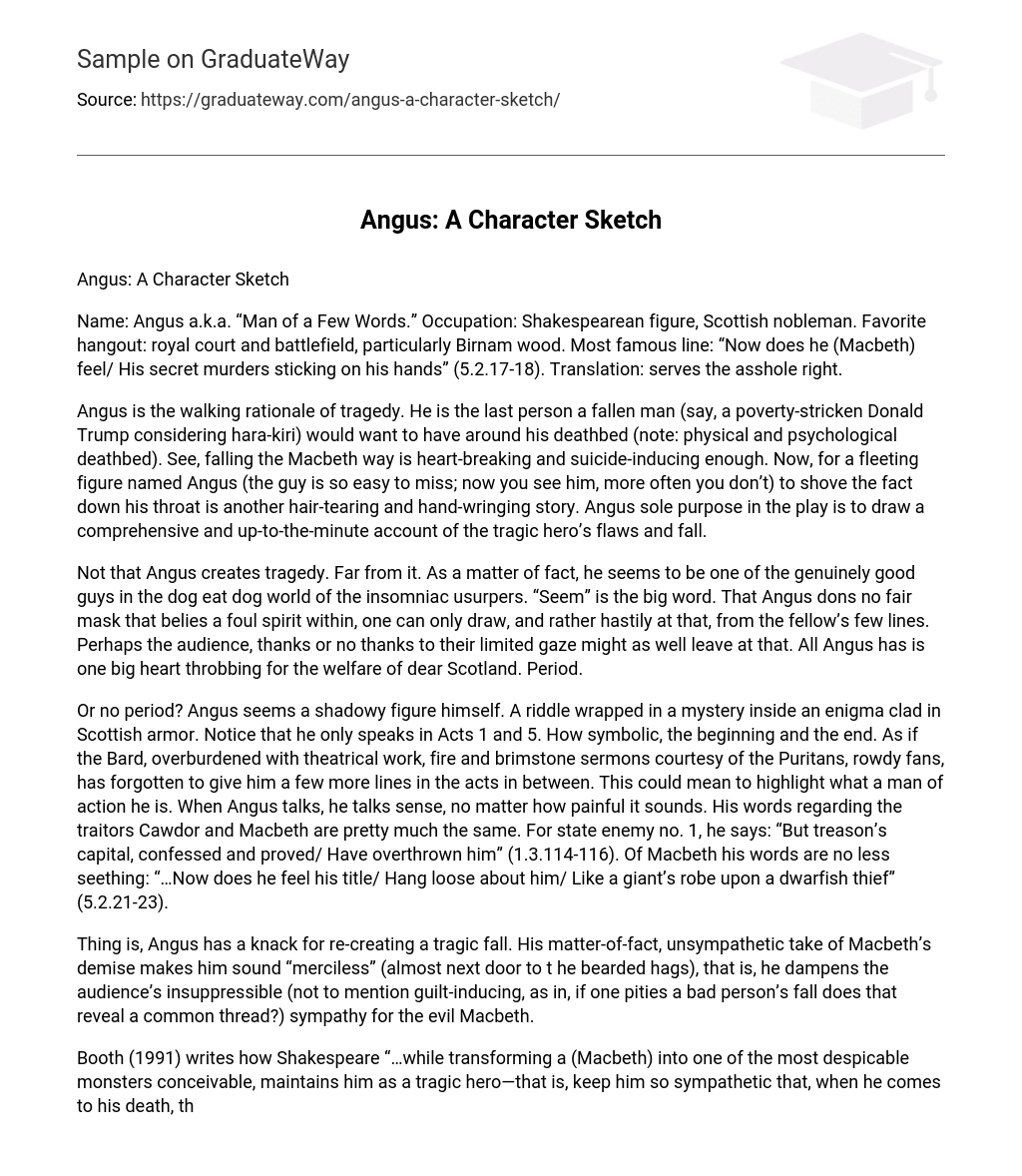Name: Angus, also known as the “Man of a Few Words.” Occupation: Shakespearean figure and Scottish nobleman. Favorite hangout: the royal court and battlefield, especially Birnam Wood. Most famous line: “Now does he (Macbeth) feel/ His secret murders sticking on his hands” (5.2.17-18). Translation: serves the asshole right.
Angus is the walking rationale of tragedy. He is the last person a fallen man (say, a poverty-stricken Donald Trump considering hara-kiri) would want to have around his deathbed (note: physical and psychological deathbed). See, falling the Macbeth way is heart-breaking and suicide-inducing enough. Now, for a fleeting figure named Angus (the guy is so easy to miss; now you see him, more often you don’t) to shove the fact down his throat is another hair-tearing and hand-wringing story. Angus’s sole purpose in the play is to draw a comprehensive and up-to-the-minute account of the tragic hero’s flaws and fall.
Not that Angus creates tragedy. Far from it. As a matter of fact, he seems to be one of the genuinely good guys in the dog-eat-dog world of the insomniac usurpers. Seem” is the big word. That Angus dons no fair mask that belies a foul spirit within, one can only draw, and rather hastily at that, from the fellow’s few lines. Perhaps the audience, thanks or no thanks to their limited gaze, might as well leave it at that. All Angus has is one big heart throbbing for the welfare of dear Scotland. Period.
Or no period? Angus seems like a shadowy figure himself. He is a riddle wrapped in a mystery inside an enigma, clad in Scottish armor. Notice that he only speaks in Acts 1 and 5. How symbolic, representing the beginning and the end. It is as if the Bard, burdened with theatrical work, fire and brimstone sermons courtesy of the Puritans, and rowdy fans, has forgotten to give him a few more lines in the acts in between. This could mean to highlight what a man of action he is. When Angus talks, he speaks sense, no matter how painful it may sound. His words regarding the traitors Cawdor and Macbeth are pretty much the same. For state enemy number one, he says: “But treason’s capital, confessed and proved, have overthrown him” (1.3.114-116). Of Macbeth, his words are no less seething: “…Now does he feel his title hang loose about him, like a giant’s robe upon a dwarfish thief” (5.2.21-23).
Thing is, Angus has a knack for re-creating a tragic fall. His matter-of-fact, unsympathetic take on Macbeth’s demise makes him sound “merciless” (almost next door to the bearded hags). That is, he dampens the audience’s insuppressible sympathy (not to mention guilt-inducing – if one pities a bad person’s fall, does that reveal a common thread?) for the evil Macbeth.
Booth (1991) writes about how Shakespeare transformed Macbeth into one of the most despicable monsters conceivable, yet kept him sympathetic enough that the audience would pity rather than detest him when he met his demise (9). In this case, Angus serves as a constant reminder of retributive justice, providing a strong but not omnipresent check on the audience’s feelings. What goes around comes around, Macbeth. Angus offers no excuse or justification, just a plain and commonsensical picture of tragedy.
A modern Angus will be more or less like this: he begins by saying that So-and-so has just ended up behind bars. The listener blurts out a big “Why?” (So-and-so is reputed to be a good man). Angus retorts that it is So-and-so’s fault, that justice has simply taken its natural course, etc. Angus’ character is perhaps his reason for being. He, as with any of the characters, exists in the face of evil. A rational take on tragedy is a means of self-preservation. It is easy to imagine Angus asking himself: now that you have seen them fall, are you following their missteps?
References.
Booth, W. (1991) identified Macbeth as a tragic hero in Harold Bloom’s (Ed.) book, Macbeth (pp. 91-).
101. New York: Chelsea House Publishers.
Shakespeare, W. (1927). The Tragedy of Macbeth. (S.W. Searson, Ed.). London:
University Publishing Company.





